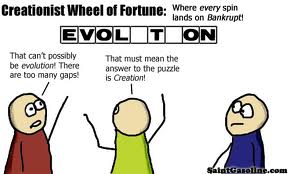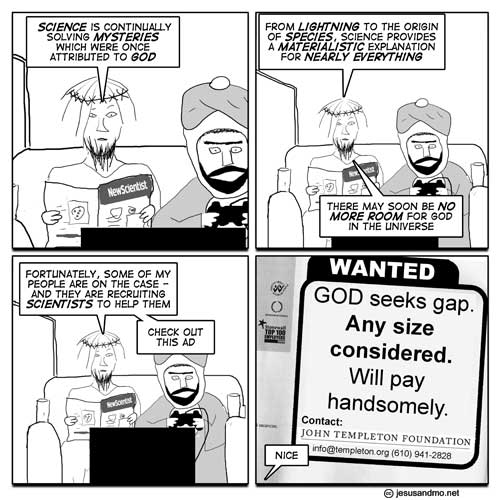The Bible
God of the Gaps
-
There are things that Evolution doesn't explain. These are 'gaps' in what science knows. The only way to fill the 'gap' is to assert that God must have done it.

Well, No
-
This tactic is grounded in a logical fallacy called argumentum ad ignorantiam, or "argument from ignorance." The illogical reasoning goes like this: if there is no satisfactory terrestrial explanation for, say, the Nazca lines of Peru, the Easter Island statues or the Egyptian pyramids, then the theory that they were built by aliens from outer space must be true.
It's easy to show that this is a false argument. If you are told that a car isn't black, does that mean it's white? If there is a 'gap' in Evo - something that is not yet explained - there are several possible outcomes:
Possible Explanations
-
It could be that:
the Christian god did it
another god is actually running things (just about every society in history has a creation story)
a space alien is responsible
science will eventually come up with the answer
Guess which one has been the correct answer so far?
Have We Seen This Argument Before?
-
Well, yes. A thousand years ago, Western society believed God was responsible for everything.
Your cow died. God was punishing you for your sins.
Your child died. Ditto.
The milk curdled. Ditto.
The church got hit by lightning. God was pissed with the whole town.
A Thousand Years of Evidence
-
Over the last thousand years, humanity has found answers to many natural questions. And guess what? The answer has always been a scientific one. We have never found a shred of evidence that a supernatural being was operating, or an alien or any other cause outside what we can observe in our world.
We no longer believe that thunder and lightning are god's thunderbolts. We think germs cause disease, not sinners.
Rational vs Emotional
-
In fact lightning was one of the first 'gaps' to be filled in. In the Middle Ages, churchmen were distressed that their fine churches, with their magnificent steeples, got far more than their share of lightning strikes, usually with catastrophic effects on the architecture. Why was God attacking His Own Houses of Worship?
The emotional, sounds-good-to-me answer to that question was that maybe he didn't notice that they were churches. (A strange view of their all-powerful god, but they were desperate) So the solution was to ring the church bells every time there was a thunderstorm. Are you getting the picture? Heavy rain soaks the bell ropes, lightning strikes the belltower, bellringers get electrocuted.
Enter the scientists. They noticed that lightning struck the highest object around, and they deduced that lightning was electricity, and as such could be conducted safely to the ground by continuous strip of metal. A few experiments confirmed that the Theory of Electricity (note the capital T for Theory) was correct. Churches that installed the lightning rods survived strikes; churches which refused on the grounds that it was meddling with god's will, installed the rods when they rebuilt.
Rational science 1; emotive superstition zero.
The Way We Think
-
This is a fundamental problem with making god the answer to everything you don't understand. The explanation satisfies (the religious person) but it is a) wrong b) unhelpful.
History has taught us this lesson time and again, every time a scientific advance fills in a gap. No wasn't 'god's will' that you got food poisoning, it was because the cook didn't wash his hands. No it wasn't 'god's will' that a group of kids from a christian school were drowned in a flash flood in a narrow canyon, it was because nobody noticed a storm in the headwaters of the river.
The Gaps Are Shrinking, God Is Getting Smaller

In the last thousand years, science has explained a lot of nature.
The big problem for those who used this approach ("Oh look, they can't explain that") was that each new discovery left less room for their God
If you follow this approach, then God is retreating.

Wikipedia is your friend here
-
Bonhoeffer wrote, for example: "...how wrong it is to use God as a stop-gap for the incompleteness of our knowledge. If in fact the frontiers of knowledge are being pushed further and further back (and that is bound to be the case), then God is being pushed back with them, and is therefore continually in retreat. We are to find God in what we know, not in what we don't know."
Wikipedia article on God of the Gaps
What Good Is Half an Eye?
-
One of the "Explain That!" gaps was prompted by the complexity of the human eye. The gist of the argument was that eyes were really complex, and couldn't possibly have evolved, because, after all "What good was half an eye?". Well it turned out that half an eye was extremely useful. Even a hundredth of an eye was better than nothing - primitive organisms which could sense light migrated to the surface of the sea during the day, then sank to the bottom at night to reduce predation.
Nobody is silly enough to trot this argument out now, because it's been refuted in great detail, but 100 years ago it was popular.
If you need a rehash of what we know today, Wikipedia is your friend
Irreducible Complexity
-
Creationists have had to give up on the eye as "something not explained by science" because it's been exhaustively explained.
So they were forced to go to the molecular level. Michael Behe invented the term irreducible complexity in a 1995 book Darwin's Black Box.
Behe suggested that there were things (such as the blood clotting cascade, the immune system and the bacteria flagella) that were so complex that any intermediate steps would not have been functional. Therefore they must have been designed.
Wikipedia has a fuller explanation here
In the book, Behe challenged the scientific community to 'put up or shut up.' He said that if they couldn't come up with and publish evidence to support their position they should admit defeat and retract.
Between 1995 and the 2005 Dover Area School Trial extensive research demonstrated ways in which each of these examples could have evolved. The trial had a farcical aspect when Behe, who is quite short, was put in the witness box. The prosecutor produced volume after volume of scientific publications of peer reviewed studies which supported the evolutionary explanation, which he stacked on the walls of the witness box. Then, he asked Behe, by then completely out of sight behind the wall of books, what publications he could produce that supported his view. He was forced to concede that there were none.
(Despite his earlier challenge to 'publish or perish' Behe refused to concede. The judge ruled that his total lack of evidence compared with what the science community had produced meant that his idea had been rebutted.)
Saves Thinking
